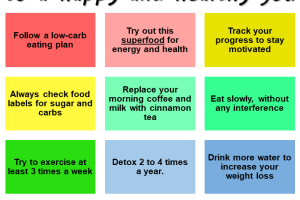Unlocking the Key to a Healthier Lifestyle: Tips and Tricks

Why Prioritizing Health is Important
In a world teeming with responsibilities and distractions, prioritizing health can often take a backseat. However, neglecting our well-being can lead to adverse effects not only on our physical state but also on our mental health, productivity, and overall quality of life. Consider this: when you feel drained or unwell, everything from the simplest tasks to fulfilling personal goals becomes a struggle. By making health a priority, one can experience:
- Unlocking the Key to a Healthier Lifestyle: Tips and Tricks
- Why Prioritizing Health is Important
- Setting Realistic Health Goals
- Understanding Your Body's Needs
- Incorporating Physical Activity into Your Routine
- Healthy Eating Habits
- Importance of Balanced Nutrition
- Tips for Meal Planning and Preparing Healthy Meals
- Prioritizing Mental Health
- Stress Management Techniques
- Importance of Self-Care Practices
- The Role of Sleep in Health
- Establishing a Healthy Sleep Routine
- Tips for Improving Sleep Quality
- Finding Motivation and Accountability
- Importance of Support System
- Setting Rewards for Milestones
- Incorporating Physical Activity
- Different Types of Exercises to Try
- Creating a Sustainable Workout Routine
- Staying Consistent with Healthy Habits
- Overcoming Challenges and Setbacks
- Tracking Progress and Celebrating Success
- Understanding the Importance of Hydration
- Benefits of Drinking an Adequate Amount of Water
- Tips for Staying Hydrated Throughout the Day
- Balancing Work and Personal Life
- Strategies for Managing Time Effectively
- Setting Boundaries for a Healthier Lifestyle
- Increased Energy Levels: Regular exercise and proper nutrition fuel the body, promoting vigor.
- Enhanced Mental Clarity: A healthy mind boosts focus and creativity, empowering problem-solving skills.
- Stronger Resilience: A robust physique contributes to enduring stress better in challenging times.
Ultimately, taking charge of one’s health isn’t merely an individual endeavor; it’s a pivotal step towards leading a fulfilling and productive life. By investing time and resources in wellness, individuals are better equipped to tackle life’s myriad challenges and enjoy every moment.
Setting Realistic Health Goals
Understanding Your Body’s Needs
To embark on any health journey, it’s vital to first comprehend your body’s unique requirements. Each person has different fitness levels, dietary needs, and health considerations. For instance, someone recovering from an injury will approach fitness differently than a seasoned athlete. To get started, here are some steps to help you understand your body’s needs:
- Consult a Healthcare Professional: Always seek advice to tailor your goals based on personal health history.
- Listen to Your Body: Pay attention to how you feel after eating certain foods or exercising in different ways.
- Set Baselines: Track your current habits and identify areas for improvement.
Incorporating Physical Activity into Your Routine
Once you understand your body, the next step is integrating physical activity into your daily life. The idea is to make movement enjoyable and sustainable. Consider these tips:
- Choose Activities You Enjoy: Whether it’s dancing, swimming, or hiking, engaging in fun activities makes it easier to stick to your routine.
- Start Small: Aim for 10-15 minutes of physical activity daily to kickstart your journey. Gradually increase the duration and intensity.
- Schedule Workouts Like Appointments: Treat your workout time as a non-negotiable commitment, ensuring you prioritize it amidst your busy schedule.
By understanding your body and incorporating enjoyable physical activities into your routine, you seamlessly lay the foundation for realistic health goals that can lead to sustainable changes.
Healthy Eating Habits
Importance of Balanced Nutrition
As you set realistic health goals and incorporate physical activity, one cannot overlook the pivotal role of balanced nutrition. A well-rounded diet is the cornerstone of good health, providing the energy needed for daily activities while also supporting your body’s vital functions. For instance, think of your body as a high-performance vehicle; it requires quality fuel to run efficiently. A balanced diet typically consists of:
- Proteins: Essential for tissue repair and muscle growth (e.g., lean meats, beans, and nuts).
- Carbohydrates: The primary source of energy (e.g., whole grains and fruits).
- Fats: Necessary for hormone production and nutrient absorption (e.g., avocados and olive oil).
- Vitamins and Minerals: Important for overall health, found in a variety of fruits and vegetables.
Tips for Meal Planning and Preparing Healthy Meals
Planning meals ahead allows you to make healthier choices and resist the temptation of fast food. Here are some practical tips to get started:
- Make a Weekly Meal Plan: Outline your meals for the week to simplify grocery shopping and cooking.
- Prep Ingredients in Advance: Chop vegetables, cook grains, or batch-cook proteins to save time during the week.
- Experiment with Flavors: Use herbs and spices to enhance the taste of healthy dishes without adding calories.
By prioritizing balanced nutrition and engaging in thoughtful meal planning, you empower yourself to make healthier choices that support your overall wellness journey.
Prioritizing Mental Health
Stress Management Techniques
As you cultivate healthy eating habits and stay active, it’s equally crucial to pay attention to mental health. In today’s fast-paced world, stress can pile up quickly, impacting both physical health and emotional well-being. Adopting effective stress management techniques can make a significant difference. Consider these strategies:
- Mindfulness and Meditation: Taking just 10 minutes a day to practice mindfulness can help clear your mind and reduce anxiety.
- Deep Breathing Exercises: When feeling overwhelmed, try inhaling deeply for a count of four, holding for four, and exhaling for four. This can calm your nervous system.
- Outdoor Activities: Spending time in nature not only helps relieve stress but also promotes a sense of peace and relaxation.
Importance of Self-Care Practices
In conjunction with stress management, self-care practices are vital for maintaining mental health resilience. Regular self-care helps recharge your emotional batteries.
- Prioritize “Me Time”: Set aside time each week for activities you love, whether it’s reading a book, taking a long bath, or pursuing a hobby.
- Cultivate Healthy Relationships: Surround yourself with positive influences; engaging with uplifting friends can improve your mood.
- Limit Screen Time: Reducing time on social media can lead to improved mental clarity and reduced anxiety.
By incorporating stress management techniques and self-care practices into your routine, you can create a healthier mental environment that supports your overall well-being journey.
The Role of Sleep in Health
Establishing a Healthy Sleep Routine
As you prioritize mental health with stress management and self-care, don’t underestimate the significance of sleep. Quality sleep is crucial for overall health, influencing everything from mood to productivity. Establishing a healthy sleep routine can set the foundation for restorative rest. To cultivate a beneficial sleep environment, try these strategies:
- Consistency is Key: Go to bed and wake up at the same time every day, even on weekends, to regulate your body’s internal clock.
- Create a Calming Pre-Sleep Ritual: Engage in activities like reading or gentle stretching to signal your body that it’s time to wind down.
- Limit Screen Time: Aim to turn off electronic devices at least an hour before bedtime to reduce exposure to blue light, which can interfere with melatonin production.
Tips for Improving Sleep Quality
Once you’ve established a routine, focus on enhancing sleep quality. Here are some effective strategies:
- Optimize Bedroom Conditions: Keep your bedroom dark, cool, and quiet for an ideal sleeping environment.
- Be Mindful of Food and Drink: Avoid large meals, caffeine, and alcohol close to bedtime, as they can disrupt sleep.
- Incorporate Relaxation Techniques: Gentle yoga or meditation can help ease the mind and prepare the body for restful slumber.
By prioritizing a healthy sleep routine and enhancing sleep quality, you strengthen your overall health. This, in turn, supports your journey toward wellness, enabling you to face each day with renewed energy and clarity.
Finding Motivation and Accountability
Importance of Support System
After establishing healthy habits around sleep and mental wellness, it’s essential to focus on finding motivation and accountability to sustain your progress. One of the most effective ways to stay motivated is by cultivating a solid support system. Having friends, family, or even workout partners can help encourage and push you to stay on track. Consider these factors for a strong support system:
- Share Your Goals: Communicate your health goals with loved ones so they can cheer you on and check in on your progress.
- Join a Community: Participating in a group with similar interests, such as a running club or cooking class, fosters connections and accountability.
- Utilize Technology: Fitness apps often have communities where you can share achievements and receive encouragement from others on similar paths.
Setting Rewards for Milestones
In addition to a support system, setting rewards for milestones can further fuel your motivation. Celebrating your achievements reinforces positive behavior and makes the journey enjoyable. Here are ways to reward yourself:
- Short-Term Rewards: Treat yourself to a small indulgence, like a favorite snack or a movie night, for accomplishing weekly goals.
- Long-Term Rewards: Plan a bigger reward, such as a weekend getaway or new workout gear, for achieving significant milestones.
- Non-Food Rewards: Opt for experiences, like a spa day or a fun outing, to avoid linking rewards solely to food.
By leaning on a supportive network and implementing a reward system, individuals can maintain motivation and accountability on their health journey. This, in turn, leads to a sustained commitment to achieving long-term wellness goals.
Incorporating Physical Activity
Different Types of Exercises to Try
As you continue your journey towards health with motivation and accountability, the next step is to make physical activity an integral part of your routine. Incorporating various types of exercises can keep things fresh and enjoyable! Here are a few options to consider:
- Cardiovascular Exercises: Activities like running, cycling, or swimming boost heart health and endurance.
- Strength Training: Lifting weights or using resistance bands helps build muscle and increase metabolism.
- Flexibility and Balance: Yoga or Pilates improve flexibility and core strength, enhancing overall stability.
- Sports and Recreation: Engaging in team sports—such as soccer or basketball—can be a fun way to get moving.
Creating a Sustainable Workout Routine
Once you’ve explored different exercises, it’s essential to create a sustainable workout routine that fits your lifestyle. Here are some tips to help you establish a consistent plan:
- Set Realistic Goals: Start with achievable targets, like exercising 3-4 times a week for 30 minutes. Gradually increase duration and intensity as you progress.
- Mix It Up: Combine different exercises to prevent boredom and work various muscle groups. For instance, alternate between cardio, strength training, and flexibility exercises throughout the week.
- Schedule Workouts: Treat your workouts as appointments on your calendar. Setting aside specific times helps ensure consistency.
By exploring various types of exercises and developing a sustainable routine, individuals can effectively integrate physical activity into their lives, supporting overall health and wellness. This approach not only enhances physical fitness but also contributes to mental well-being and increased energy levels.
Staying Consistent with Healthy Habits
Overcoming Challenges and Setbacks
As you’ve established an enjoyable routine for incorporating physical activity, the next step is to focus on staying consistent with these healthy habits. However, challenges and setbacks are part of the journey. Life can be unpredictable, and it’s important to have strategies in place to overcome obstacles. Here are some tips:
- Acknowledge Setbacks: Understand that mistakes happen. Instead of being hard on yourself, view setbacks as learning opportunities.
- Adjust Expectations: If you miss a workout or indulge in unhealthy food, tweak your plan rather than abandoning it entirely.
- Stay Flexible: Sometimes a change in schedule requires a quick pivot. If you can’t hit the gym, a brisk walk can still keep you active.
Tracking Progress and Celebrating Success
To maintain motivation, tracking your progress and celebrating successes—big or small—is key. Keeping a record provides a visual reminder of how far you’ve come. Consider these strategies:
- Use a Journal or App: Document your workouts, food intake, and emotional state to identify patterns and celebrate improvements.
- Set Milestones: Break your larger goals into smaller, achievable milestones. Each accomplishment deserves acknowledgment.
- Celebrate Non-Scale Victories: Recognize achievements that aren’t related to weight, like increased energy or improved mood.
By anticipating challenges and celebrating progress, individuals can stay committed to their healthy habits, ensuring a long-term, fulfilling journey toward wellness. Every step taken, no matter how small, is a victory worth celebrating!
Understanding the Importance of Hydration
Benefits of Drinking an Adequate Amount of Water
As you work to stay consistent with your healthy habits, don’t forget about the cornerstone of good health—hydration. Drinking an adequate amount of water is crucial for overall well-being. Proper hydration offers numerous benefits, such as:
- Improved Physical Performance: Staying hydrated enhances endurance and strength during workouts, helping you push through that extra mile or lift heavier weights.
- Enhanced Cognitive Function: Studies show that even mild dehydration can impair concentration and mood. Keeping hydrated helps maintain focus.
- Healthy Digestion: Water aids in digestion, preventing constipation and facilitating the absorption of nutrients.
Tips for Staying Hydrated Throughout the Day
To ensure you meet your hydration goals, here are some practical tips:
- Carry a Water Bottle: Having a reusable bottle on hand makes it easier to sip throughout the day.
- Set Reminders: Use your phone or a hydration app to remind you to drink water at regular intervals.
- Infuse Flavor: If plain water bores you, try adding slices of fruit, cucumber, or herbs to make it more enticing.
By understanding the importance of hydration and implementing these tips, you can effectively support your body in achieving optimal health. Staying hydrated complements your healthy eating habits, physical activity, and overall wellness journey—ensuring you feel your best every day!
Balancing Work and Personal Life
Strategies for Managing Time Effectively
As you focus on hydration and maintaining healthy habits, it’s essential to find balance between work and personal life. Managing time effectively can lead to reduced stress and enhanced well-being. Here are some strategies to consider:
- Prioritize Tasks: Start each day by identifying the most important tasks. Use a to-do list to stay organized and focused.
- Utilize Time Blocks: Allocate specific time slots for work projects and personal activities. This structure can help you remain dedicated to each area without overlap.
- Learn to Say No: Recognize your limits and decline additional responsibilities that could overwhelm your schedule. Protecting your time is crucial for maintaining balance.
Setting Boundaries for a Healthier Lifestyle
In tandem with effective time management, setting boundaries is vital for a healthier lifestyle. This means establishing clear lines between work and personal time.
- Designate Work Hours: Stick to specific work hours and avoid checking emails or completing tasks after hours to prevent burnout.
- Create a Dedicated Workspace: If possible, carve out a designated area for work in your home. This physical separation can help signify when it’s time to work versus relax.
- Encourage Breaks: Regular breaks during the workday can improve focus. Aim for short walks or stretching every hour.
By implementing these strategies for managing time and setting clear boundaries, individuals can foster a balanced lifestyle. This not only enhances productivity but also boosts overall well-being, allowing you to enjoy both work and personal time to the fullest.





